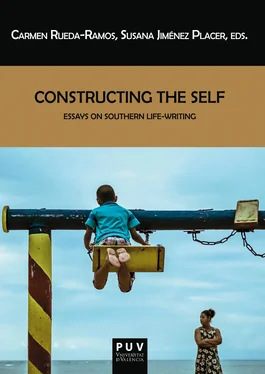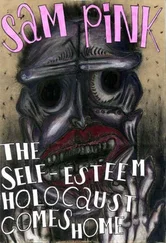Works Cited
Andrews, William L. “Autobiography.” The Oxford Companion to African American Literature . Ed. William L. Andrews, Frances Smith Foster, and Trudier Harris. New York: Oxford, 1997. 34-37. Print.
Angelou, Maya. I Know Why the Caged Bird Sings . New York: Random House, 1970. Print.
Barksdale, Richard and Keneth Kinnamon. Black Writers of America: A Comprehensive Anthology . New York: Macmillian, 1972. Print.
Blackmon, Douglas A. Slavery by Another Name: The Re-Enslavement of Black People in America from the Civil War to World War II . New York: Doubleday, 2008. Print.
Brodhead, Richard, ed. The Journals of Charles W. Chesnutt. Durham: Duke UP, 1993. Print.
Douglass, Frederick. Narrative of the Life of Frederick Douglass, An American Slave, Written by Himself . 1845. Cambridge: Harvard UP/Belknap, 1980. Print.
Gabbin, Joanne V., ed. Mourning Katrina: A Poetic Response to Tragedy . James Madison U: Furious Flower Poetry Center, 2009. Print.
Gates Jr., Henry Louis. Colored People . New York: Knopf, 1994. Print.
Harris, Trudier. Summer Snow: Reflections from a Black Daughter of the South . Boston: Beacon, 2003. Print.
Holloway, Karla F. C. BookMarks: Reading in Black and White: A Memoir . New Brunswick: Rutgers UP, 2006. Print.
---. Codes of Conduct: Race, Ethics, and the Color of Our Character. New Brunswick: Rutgers UP, 1995. Print.
Hughes, Langston. The Big Sea . New York: Hill and Wang, 1940. Print.
Hurston, Zora Neale. Dust Tracks On a Road . 1942. New York: Harper/Perennial, 1991. Print.
---. Mules and Men . 1935. New York: Perennial, 1990. Print.
Jacobs, Harriet. Incidents in the Life of a Slave Girl, Written by Herself . 1861. Cambridge: Harvard UP, 1987. Print.
Johnson, Mat. Dark Rain . New York: DC Comics, 2010. Print.
McDowell, Deborah. Leaving Pipe Shop: Memories of Kin . New York: Scribner, 1996. Print.
McKay, Claude. A Long Way from Home . 1937. New York: Harcourt, Brace & World, 1970. Print.
Moody, Anne. Coming of Age in Mississippi . New York: Dell, 1968. Print.
Porter, Horace A. The Making of a Black Scholar: From Georgia to the Ivy League . Iowa City: U of Iowa P, 2003. Print.
Trethewey, Natasha. Beyond Katrina: A Meditation on the Mississippi Gulf Coast . Athens: U of Georgia P, 2010. Print.
Walker, Alice. “Choice: A Tribute to Dr. Martin Luther King, Jr.” In Search Of Our Mothers’ Gardens . New York: Harcourt, 1983. 142-145. Print.
---. Meridian . New York: Harcourt, 1976. Print.
Ward Jr., Jerry W. The Katrina Papers: A Journey of Trauma and Recovery . New Orleans: U of New Orleans P, 2008. Print.
Ward, Jesmyn. Salvage the Bones . New York: Bloomsburg, 2011. Print.
Washington, Booker T. Up From Slavery . 1901. New York: Norton, 1996. Print.
Wright, Richard. Black Boy . New York: Harper and Brothers, 1945. Print.
Working a Lever: Booker T. Washington’s Autobiographies as Tools for Social Change
Robert H. Brinkmeyer, Jr. Institute for Southern Studies University of South Carolina
In his introduction to a reprinting of Up From Slavery , Louis Harlan observes that Booker T. Washington “saw his role as a sort of axis between the races, the only man who could negotiate with each group and keep the peace by holding extremists on both sides in check” (xiv). The striking image of the axis conjures up several different images. One is of an imaginary line dividing blacks and whites in the South, with Washington standing at the center, keeping the line secure so that the two races remain in close proximity but entirely separate. In this I’m reminded of Lillian Smith’s characterization of segregation as the mapping of southern townscapes with lines that were sometimes visible, as with the words “white” and “colored” that stood above public drinking fountains and restrooms, and sometimes invisible, as with the unwritten but strictly enforced laws that established parameters for black conduct and movement. As a keeper of the dividing line, Booker T. Washington stands as the appeaser who successfully works the system for personal and professional gain, while never challenging the grinding oppression of black people. Another meaning of axis, that of an agreement or a pact (as in the Axis powers of World War II), conjures up an image of Washington as an alliance builder between whites and blacks, seeking to construct a more racially tolerant South after the upheavals of the Civil War and Reconstruction. In this image, Washington stands as the skillful statesman bringing together opposing sides for discussion, compromise, and action. Neither image is an entirely satisfactory representation of Washington.
But by overlaying the two images—Washington as alliance builder as well as defender of the dividing line—one arrives at a more rich and complicated portrait of Washington, one resembling that which has emerged in much recent scholarship. With this more complicated portrait in mind, I want to explore how Washington constructed himself in his autobiographical writings, particularly Up From Slavery and Working with the Hands , as well as to complicate that portrait by bringing in another image, the lever, to suggest that Washington, all the while that he was publicly defending the South’s dividing line, was at the same time subversively attempting to pry it apart. The subversive work of the lever is most clearly seen in Washington’s discussions of the achievements people gain by working with their hands and by making things. To understand this subversive work—how in the hands of Washington handwork and making became a powerful tool to unhinge the line of segregation—we need first to establish the context in which this destabilizing work takes place, how it fits within the broad strategies Washington used to construct himself in his autobiographies.
As is well known, Washington modeled Up From Slavery closely after Benjamin Franklin’s Autobiography , a move that not only elevated Washington’s stature but also, by implication, other southern blacks who followed in Washington’s footsteps. Franklin’s influence upon Up From Slavery is probably greater than even generally acknowledged, extending from broad conception down to specific narrative strategies and situations, including the text’s first sentence, “I was born a slave on a plantation in Franklin County, Virginia” (1). While of course Washington had no choice in deciding in what county he was born, he certainly had a choice, as James Olney has pointed out, in including its name in his autobiography’s opening words (11), a rhetorical move that heralds Franklin’s guiding presence. That presence is perhaps most apparent in Washington’s construction of Up from Slavery as a conduct book for productive citizenship, though not quite as obviously as Franklin’s. Franklin all but announces his edifying purpose by constructing Part One of his autobiography as a letter to his son, offering fatherly advice and eventually setting himself up as a model of civic duty and social responsibility, to be emulated not only by his son but, by implication, by all Americans. (Franklin doesn’t mention that by the time he began writing his autobiography in 1771, his son was already Royal Governor of New Jersey and obviously needed no such instruction.) Although not using the letter-to-a-child format, Washington nonetheless follows Franklin in presenting himself as a model of productive citizenship, one for blacks to emulate and for whites to admire—or, at least for whites to recognize that Washington, as a representative of black Americans, was a useful citizen, a successful businessman, and a prominent educator. He was not, in other words, what the prevailing racist ideology made of black men: dangerous beasts, un-educable and ravenous.
Читать дальше












